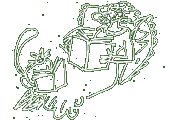FAQs
Q. What do you write about?
A. Food, sex, saints, death, love, memory, desire, power relationships,
perversity; whatever obsesses me at a given time.
Q. How do you know what you want to write
about?
A. I become haunted by it. I dream about it. A novel erupts from
a visual image, often a dream image, often an image of a dead body.
Q. What kind of books do you write?
A. Mainly novels, poems, short stories, though I have also written
two plays and one film. I am fascinated by the difference between
forms. I have written a novel (Flesh and Blood) composed of short
stories (all broken in half) and I have written a short story (in
Playing Sardines) that in effect is a novel. Form is the crucial
thing. Once you've got an idea of the form a novel will take, why
it needs a particular narrative perspective, then you can get going.
Q. Do you use a computer?
A. Everything begins as ink scribble in the notebook I carry. At
some point these handwritten notes for a story or novel transfer
onto the computer. Up until then you can pretend you're not doing
it, so that the process is unselfconscious and unanxious. Once I've
properly begun, I enjoy the process of editing on screen. I print
out at night what I've written during the day, because I like reading
hard copy and can scribble corrections on it more easily. Poetry,
however, I write in longhand on big sheets of paper. I write these
out over and over, twenty versions perhaps, the poem growing a bit
more each time, until it's done. I redraft a great deal. That's
what writing means: rewriting.
Q. Why did you want to write?
A. Growing up bilingual, in a French-English family, I was fascinated by
language and by language translating itself back and forth. Also, I wrote
to invent a culture, a world, I could belong in. Catholicism was a misogynistic
religion and I needed to write my way out of it. In the process, I discovered
the power of making shapes with words, making new realities. My father wrote
short stories, which were never published; he inspired me. My English grandmother
was a great storyteller; she inspired me too. And of course Catholicism,
I realised, was a great treasure trove of stories which I could re-tell.
I wanted to smash up the old stories, which I felt had damaged me, and make
something new with them. Omniscient narrators such as God the Father and
the Pope had snared me as an object in their stories; I needed to write
women in as our own subjects. Struggling heroes of our own stories. I needed
a narrative perspective from down here on the ground, not up there in the
sky, and I needed to create different, clashing narrative perspectives,
to expose how we quarrel over what is true, what happens. I don't believe
any longer in one truth. That's for religion, not for novelists. Now I think
I write for other reasons too: to converse with the reader, play with and
tease the reader, with luck please the reader in the end.
Q. Who or what is your muse?
A. My mother was for a long time. My father was the muse for one
book (Impossible Saints). I've written books inspired by whomever
I was in love with at the time. The lover, or the fantasy lover,
becomes the muse for that particular book. The book then becomes
the gift to the lover.
Q. What is your advice to young writers?
A. Don't give up.


